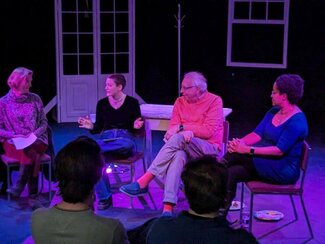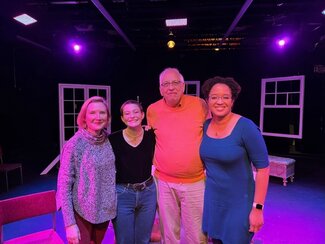Saturday evening theater enthusiasts and climate activists alike gathered in the Armory Free Theatre to watch Sophia Urban, senior in FAA, present their senior thesis production of “Hurricane Diane.” The show was accompanied by a discussion with Deanna Hence, assistant professor in LAS, and Donald Wuebbles, professor emeritus in LAS.
The discussion focused on the impact that artistic mediums can have when tackling data-heavy issues, such as climate change.
“I think about art as being a key way that people understand and process the world around them,” Hence said, a musician and dancer herself in her free time. “I think that the combination of the arts and sciences can help people understand the many lenses through which we interact with our world and each other.”
Rather than focusing on the facts and figures surrounding climate change, the speakers centered their conversation on the emotional effects that global crises can have on people.
One of the most poignant questions posed during the conversation came from Urban, which was directed toward the speakers as, “How can we sustain hope?
“I think one of the biggest ways I retain hope is I look at the minute by minute, hour by hour, day, week, month of the kindnesses that we see all around us,” Hence said. “I think it can get really depressing, but then I look around at our community and I see all of the many, many ways that people are helping each other all time.”
The speakers also stressed the climate crisis is not inherently unsolvable. Like many other issues, bringing the problem to the forefront of conversations is the first step to enacting change.
“Being hopeless gets us absolutely nowhere,” Wuebbles said. “Solutions do exist. It’s a matter of how we get that willpower to want to strive ahead, to making sure we get the right solutions.”
The discussion further explored how to mobilize people to take action during the climate crisis and how to generate their own hopefulness about the state of the ever-changing world.
Amid common suggestions to recycle and use public transportation, the speakers took a different approach, promoting artistry and communication within the spaces one finds oneself in as the main ways to promote climate action.
“I always say two important things you can do is vote carefully and communicate with others,” Wuebbles said. “Tell them why this is so important.”
“Hurricane Diane” was written by Madeleine George and follows the Greek god Dionysus as he returns to the modern world and attempts to convince a group of humans to return the Earth back to its original state.
Urban found inspiration to put on the play after reading the script in one of their classes, Theatre and the Environment. Its lighthearted, comedic moments mixed with the personal and philosophical sections are part of what made the play stick out to Urban.
“A lot of times when you think about theater, especially for social issues, there’s a very vivid preconceived notion that it’s going to be preachy and it’s gonna make you really depressed,” Urban explained. “I think the wonderful thing about this play is it doesn’t really do any of that. It’s funny, there’s lightness, there’s darkness.”
An additional inspiration to host this event came from the desire to bring attention to the need for diversity in artistic and scientific spaces, specifically concerning the LGBTQ+ community, which is a main theme of the play itself.
“It felt very important to me to do something like that on this campus when there are so many queer students that do exist and so many people that are passionate about bringing together the arts and sciences,” Urban said.
To find more information about events occurring at the Armory Free Theatre or becoming a student producer, readers can visit the Illinois Theatre Pathways of Support website.
For information on events occurring in the Department of Atmospheric Sciences, readers can visit its website.

